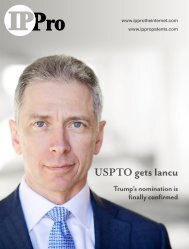IPPro Issue 002
IPPro is the go-to industry publication for news, views, and opinion on patent practice, law and management. The fortnightly publication and accompanying website - the only free-to-read intellectual property resource around - cover the full spectrum of IP law globally, including prosecution, litigation, licensing, management and technology.
IPPro is the go-to industry publication for news, views, and opinion on patent practice, law and management. The fortnightly publication and accompanying website - the only free-to-read intellectual property resource around - cover the full spectrum of IP law globally, including prosecution, litigation, licensing, management and technology.
Create successful ePaper yourself
Turn your PDF publications into a flip-book with our unique Google optimized e-Paper software.
Alibaba Update<br />
Power to the enforcers<br />
Matthew Bassiur of Alibaba, gives an update of the e-commerce company’s<br />
enforcement efforts<br />
Barney Dixon reports<br />
Third party support for Alibaba has grown in recent years. What do<br />
you think Alibaba does well in terms of enforcement?<br />
You are absolutely right. We are seeing a deeper appreciation for<br />
Alibaba’s efforts and a greater understanding of our role as a partner<br />
in intellectual property protection. In recent years, Alibaba has made<br />
it even easier for rights holders to work with us and protect their IP.<br />
These efforts are paying off for rights holders. Leading brands, small<br />
and medium-sized enterprises (SMEs) and industry associations,<br />
including some who were previously our most vocal critics, have<br />
voiced their support for and satisfaction with our programs.<br />
To illustrate, let me share some data from last year. While the number of<br />
registered accounts in our IP protection system rose 17 percent yearon-year,<br />
the number of takedown requests dropped 42 percent. We<br />
believe this is attributable to Alibaba’s efforts in proactively identifying<br />
and removing potentially problematic listings. Listings go through our<br />
scanning engine, which identifies and intercepts problematic listings<br />
within microseconds, and prevents their entry onto our platforms. In<br />
addition, our deep learning algorithms continue to apply complex<br />
modeling to proactively remove suspicious live listings. In fact, last<br />
year 97 percent of our proactive takedowns occurred before a single<br />
sale took place.<br />
Additionally, in 2017 we launched enhanced data modeling to our IP<br />
protection platform to speed up the handling of takedown requests.<br />
As a result we’ve seen a two-thirds reduction in processing time and<br />
24 hour handling time during business hours has become the new<br />
norm. To assist small businesses and individuals, we have taken<br />
the extra step of developing a simplified online form for submitting<br />
takedown requests in order to make it easier for them to report and<br />
remove infringing listings.<br />
Finally, when we do identify infringers, we take action, in 2017, we<br />
closed more than 240,000 Taobao stores.<br />
Our offline enforcement efforts are also an area of strength. Alibaba<br />
does not limit its IP protection efforts to online matters and we work<br />
closely with rights holders and Chinese law enforcement officials. In<br />
2017, there were hundreds of arrests based on information and leads<br />
provided by Alibaba. We are taking action in civil courts as well as<br />
assisting in criminal matters.<br />
To date, we have brought 12 civil actions in China. Last year, we sued<br />
two sellers of counterfeit Swarovski watches and we brought and<br />
won a lawsuit against a pet-food vendor by alleging damage to our<br />
brand and reputation for selling counterfeit cat food on our platform<br />
and in violation of our terms of service. We believe these are the first<br />
legal actions brought in China by an e-commerce company against<br />
infringing sellers on its platform.<br />
Do you think Alibaba has changed perceptions of its commitment<br />
on IP? How has Alibaba won over brands that may have previously<br />
argued that Alibaba doesn’t do enough? How does it build trust<br />
with brands?<br />
I believe perceptions have changed, yes. Collaboration between<br />
Alibaba and rights holders is essential for the protection of IP, and<br />
every day we are working with brands to understand their IP and<br />
how we can work together. We listen to, deeply value and take<br />
action based on what we hear from them.<br />
As an example, in 2016, Alibaba merged its notice and takedown<br />
systems into a single ‘one-stop’ IP protection platform. This was a<br />
significant undertaking for us, but we knew from our collaboration<br />
with rights holders that a more unified and streamlined notice and<br />
takedown system was something that would be well received. As I<br />
mentioned earlier, in 2017 we made enhancements to platform to<br />
allow for faster processing of takedown requests.<br />
Alibaba has, for years, invested heavily in both technologies; it takes<br />
time for the development, testing and implementation of technological<br />
enhancement. It also takes time for those enhancements to be<br />
adopted and the benefits realised. I think in some ways the changes<br />
in perceptions we’re seeing now are the result of sustained, years<br />
long efforts by Alibaba.<br />
It also takes time to build the trusted relationships that enable<br />
our success. More than 100,000 brands operate on our platforms,<br />
including 75 percent of the world’s most valuable consumer brands,<br />
as well as countless small businesses, all of which have thriving<br />
businesses on Alibaba’s platforms.<br />
These businesses would not choose to work with us if they did not<br />
view us as a trustworthy partner.<br />
One of the key initiatives that Alibaba launched in 2017 was the<br />
AACA. Can you tell us a little bit about the AACA and any plans<br />
for 2018?<br />
We established the Alibaba Anti-Counterfeiting Alliance (AACA)<br />
in 2017, an alliance created among Alibaba and approximately 30<br />
global and domestic China brands, including Louis Vuitton, Uniqlo<br />
and Burberry. In September of last year, we created an Advisory<br />
Board to give AACA members the chance to participate in strategic<br />
decision-making and influence policies being considered by Alibaba.<br />
Advisory Board members include Swarovski, Adidas, Ford, Pernod<br />
Ricard and Sony, among others.<br />
Representation covers each of the industries represented in the AACA,<br />
including apparel, personal care products, consumer electronics, and<br />
the automotive industry.<br />
Simply put, we leverage our<br />
big data and analytics to help target<br />
illicit manufacturers, distributors and<br />
suppliers of counterfeit products<br />
Matthew Bassiur, vice president and head of global IP enforcement, Alibaba Group<br />
We believe this is an industry first and Alibaba will hugely benefit<br />
from the input of the AACA and the Advisory Board.<br />
This year we announced that the AACA was adding more members<br />
to bring our full membership to approximately 100 brands. This not<br />
only triples the number of companies that will benefit from the AACA<br />
programs and initiatives, but provides even broader representation<br />
in the dozen industries.<br />
What role does technology play in Alibaba’s work on intellectual<br />
property protection?<br />
The online environment is reflective of the offline reality and Alibaba<br />
takes a technology-driven approach to IP protection. As a leading<br />
global technology company, we leverage our advanced algorithms<br />
and machine-learning capabilities for our online and offline IP<br />
protection efforts. Online, we proactively monitor our platforms in<br />
order to identify potentially problematic listings and take action. Our<br />
data modeling is constantly improved upon to increase the accuracy<br />
in identifying, preventing or deleting suspicious listings. Offline, we<br />
use data and analytics to build cases for referrals to law enforcement.<br />
This is in addition to responding to many valid law enforcement<br />
requests for information to support their own investigations. Simply<br />
put, we leverage our big data and analytics to help target illicit<br />
manufacturers, distributors and suppliers of counterfeit products. We<br />
are also one of the few e-commerce platforms—if not the only one—<br />
to also have such a robust, proactive offline investigations program.<br />
How else is Alibaba working to create a better environment for IP<br />
protection in China?<br />
In addition to the efforts I have already described, we view it as<br />
part of our responsibility to advocate for improvements in laws and<br />
enforcement penalties in this areas.<br />
The best example of this is the vocal public advocacy of Alibaba’s<br />
founder and executive chairman Jack Ma who last year called for<br />
stronger IP laws and enforcement in China including jail time for<br />
offenders. So it is very encouraging to see just such changes being<br />
discussed in China. <strong>IPPro</strong><br />
36 <strong>IPPro</strong> The Internet www.ipprotheinternet.com 37





